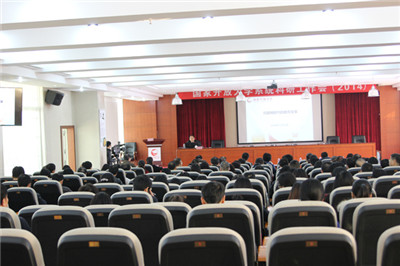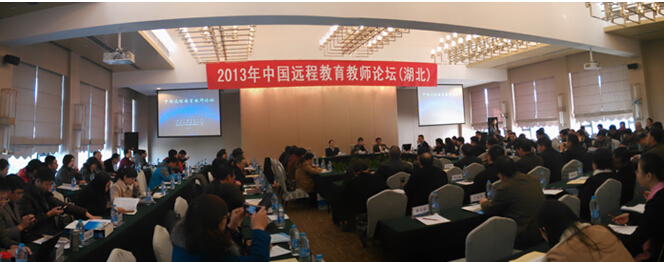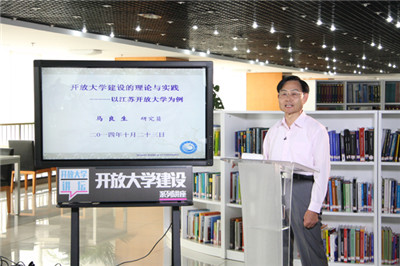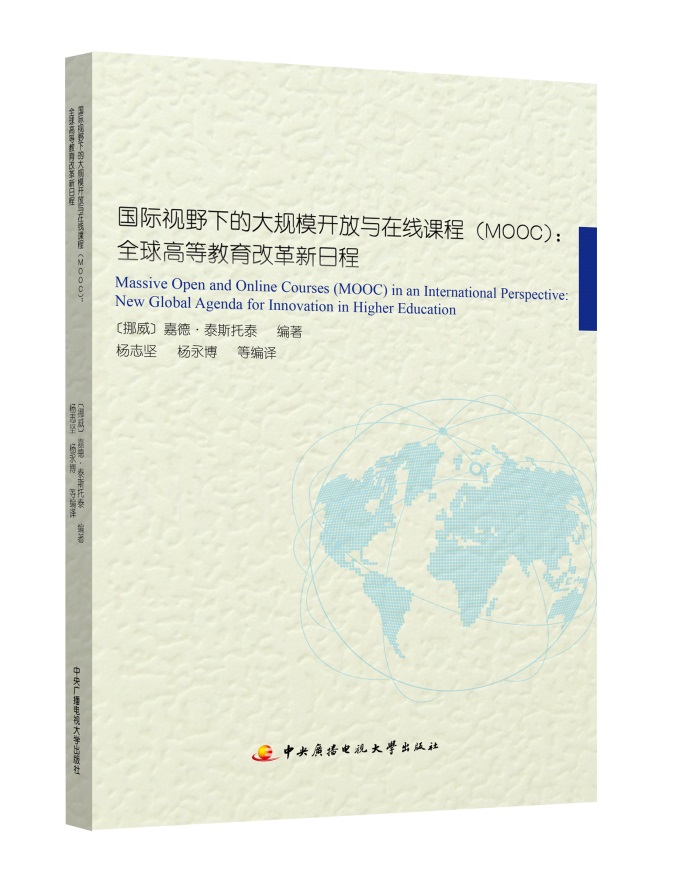 December 12-13, 2014 saw the convening of the 2014 OUC System Scientific Research Work Conference in Huizhou, Guangdong. The theme was Educational Change in the Internet Age. Nearly 100 representatives from the Open University of China (OUC) and its 42 branches gathered for meetings and discussions on advancing online scientific research and its management.
December 12-13, 2014 saw the convening of the 2014 OUC System Scientific Research Work Conference in Huizhou, Guangdong. The theme was Educational Change in the Internet Age. Nearly 100 representatives from the Open University of China (OUC) and its 42 branches gathered for meetings and discussions on advancing online scientific research and its management.
 The Seventh “Forum for Teachers in Chinese Distance Education” was held in Wuhan, Hubei on November 28, 2013. It was jointly sponsored by Hubei Radio and Television University (RTVU), the publishers of Distance Education in China and the Teacher Development Center of the Open University of China, under the theme “The real magicians: innovative applications of information technology in open university teaching practice”.
The Seventh “Forum for Teachers in Chinese Distance Education” was held in Wuhan, Hubei on November 28, 2013. It was jointly sponsored by Hubei Radio and Television University (RTVU), the publishers of Distance Education in China and the Teacher Development Center of the Open University of China, under the theme “The real magicians: innovative applications of information technology in open university teaching practice”.
 On October 23, 2014, the OUC’s “Open University Forum: Open University Construction” lecture series was officially launched, with the first lecture given by former vice president of Jiangsu Open University Researcher Ma Liangsheng. Vice Party Secretary of the OUC Zhang Hui hosted and addressed the event.
On October 23, 2014, the OUC’s “Open University Forum: Open University Construction” lecture series was officially launched, with the first lecture given by former vice president of Jiangsu Open University Researcher Ma Liangsheng. Vice Party Secretary of the OUC Zhang Hui hosted and addressed the event.
From analyzing the scale, age profile, occupational composition, regional distribution and post level of the learners in the Open University of China (OUC), it can be seen that the OUC is a mega-university with millions of learners, a university targeting the general population and embedded in society. The mission of the OUC is great, as well as formidable, for it bears on its shoulders the significant social responsibility of improving the quality of a wide range of workers, boosting the mass higher education and fairness in education and promoting the construction of a lifelong learning society for all people, and it is in this that lies the important difference between the OUC and the regular institutions of higher education, which focus on elite education.
 Massive Open and Online Courses (MOOC) in an International Perspective: New Global Agenda for Innovation in Higher Education introduced and translated by The Open University of China (OUC) from the International Council for Open and Distance Education (ICDE), published by the OUC (aka the China Central Radio & TV University, CCRTVU) Press came out in June, 2014. This book was translated and edited by the President of the OUC Yang Zhijian and the Director of the International Cooperation and Exchange Department Yang Yongbo etc., and is another important work following Open Educational Resources: Conversations in Cyberspace, a UNESCO book also translated by the OUC.
Massive Open and Online Courses (MOOC) in an International Perspective: New Global Agenda for Innovation in Higher Education introduced and translated by The Open University of China (OUC) from the International Council for Open and Distance Education (ICDE), published by the OUC (aka the China Central Radio & TV University, CCRTVU) Press came out in June, 2014. This book was translated and edited by the President of the OUC Yang Zhijian and the Director of the International Cooperation and Exchange Department Yang Yongbo etc., and is another important work following Open Educational Resources: Conversations in Cyberspace, a UNESCO book also translated by the OUC.
I. Learner composition
By the end of 2013, there were 3.6763 million active students in the Open University of China (OUC), accounting for 10.37% of active students in universities and junior colleges in China’s higher education sector (including regular institutions of higher education, adult education and online education); the total enrollment of 2013 was 1.088876 million students, accounting for 9.64% of active students (11.292355 million) in universities and junior colleges of China’s higher education sector (including regular institutions of higher education, adult education and online education).
 A Guide to Quality in Post-Traditional Online Higher Education in Chinese and English versions, developed with the investment of authoritative American educational institutions and jointly created by international higher education experts and online learning experts, were launched synchronously. The Chinese version of the book was published by the Open University of China (OUC, aka China Central Radio and TV University, CCRTVU) Press in cooperation with DeTao Master Heritures.
A Guide to Quality in Post-Traditional Online Higher Education in Chinese and English versions, developed with the investment of authoritative American educational institutions and jointly created by international higher education experts and online learning experts, were launched synchronously. The Chinese version of the book was published by the Open University of China (OUC, aka China Central Radio and TV University, CCRTVU) Press in cooperation with DeTao Master Heritures.
There are few opportunities for learners and tutors to meet during the distance teaching process, so it is natural that learners may feel loneliness of a lack of emotional contact. Tutors at distant education colleges and universities are responsible for providing students with a greater degree of care, learner support and other services. Student activities are an important part of non-academic support services, offering distant learners emotional support, and a space to communicate and interact.